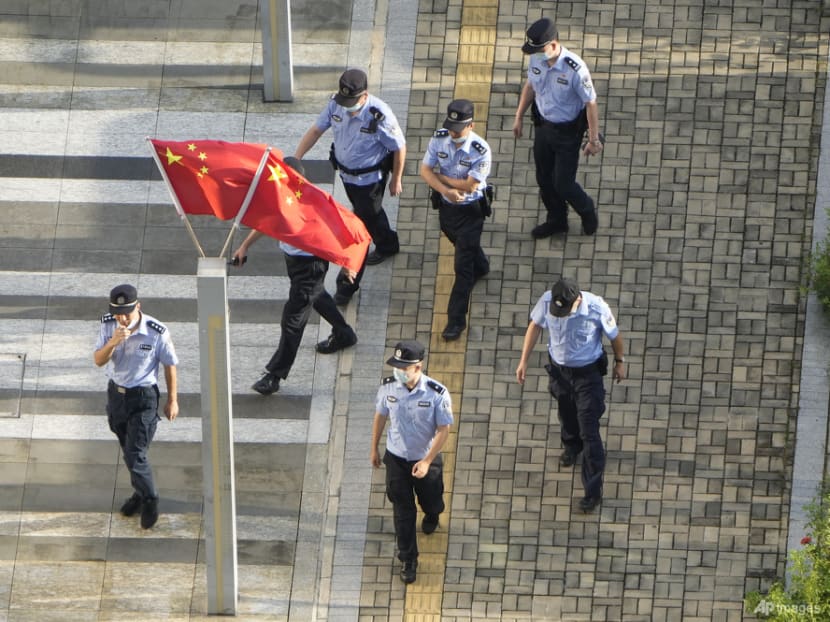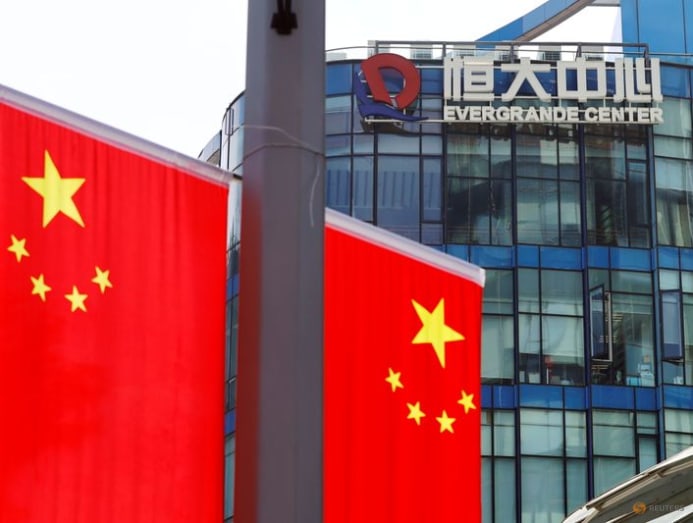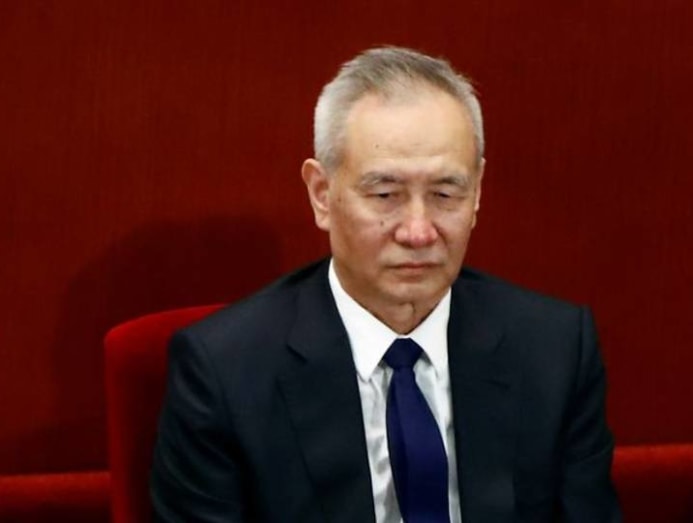Commentary: China’s leaders risk a dangerous miscalculation with Evergrande
Ad
Commentary
Commentary: People's republic of china'south leaders take a chance a dangerous miscalculation with Evergrande
The new dual thrust of Chinese policy – redistribution plus re-regulation – strikes at the heart of the marketplace-based "reform and opening up" that have underpinned Red china'due south growth miracle since the 1980s, says Stephen Due south Roach.

Chinese police force officers patrol near Chinese national flags outside the Evergrande headquarters in Shenzhen, Prc, Sabbatum, Sep 25, 2021. (Photo: AP/Ng Han Guan)
29 Sep 2022 04:25PM (Updated: 29 Sep 2022 04:25PM)
NEW Oasis, Connecticut: All optics are fixed on the dark side of China. We take been here before.
Starting with the Asian fiscal crunch of the late 1990s and continuing through the dot-com recession of the early on 2000s and the global financial crisis between 2008 and 2009, Cathay was invariably portrayed as the adjacent to fall.
Nevertheless time and again, the Chinese economy defied gloomy predictions with a resilience that took nearly observers by surprise.
Count me among the few who were not surprised that by alarms turned out to be false. But count me in when it comes to sensing that this time feels unlike.
IS EVERGRANDE THE PROBLEM?
Contrary to most, nonetheless, I do not remember Evergrande Grouping is the problem, or even the catalytic tipping bespeak.
Yes, China's second-largest property programmer is in potentially fatal trouble. And yeah, its debt overhang of some US$300 billion poses broader risks to the Chinese financial system, with potential knock-on furnishings in global markets.
But the magnitude of those ripple effects is likely to exist far less than those who loudly proclaim that Evergrande is China's Lehman Brothers, suggesting that another "Minsky Moment" may well be at hand.

Three considerations debate to the opposite. Commencement, the Chinese government has ample resources to backstop Evergrande loan defaults and ring-fence potential spillovers to other avails and markets.
With some Us$seven.v trillion in domestic saving and another US$iii trillion in strange exchange reserves, China has more than enough chapters to absorb a worst-case Evergrande implosion. Contempo big liquidity injections by the People's Bank of Red china underscore the betoken.
2d, Evergrande is not a archetype "black swan" crisis, but rather a conscious and deliberate effect of Chinese policy aimed at deleveraging, de-risking, and preserving fiscal stability.
In particular, Mainland china has made good progress reducing shadow banking activity in contempo years, thereby limiting the potential for deleveraging contagion to infect other segments of its financial markets.
Unlike Lehman and its devastating collateral damage, the Evergrande trouble hasn't blindsided Chinese policymakers.
Third, risks to the real economy, which has entered a temporary soft patch, are limited. The demand side of the Chinese property market is well supported by the ongoing migration of rural workers to cities.
This is very dissimilar from the collapse of speculative housing bubbles in other countries, like Nihon and the United States, where supply overhangs were unsupported by need.
While the urban share of the Chinese population has now risen slightly to a higher place sixty per cent, at that place is still plenty of upside until it reaches the lxxx to 85 per cent threshold typical of more than advanced economies.
Notwithstanding recent accounts of shrinking cities – reminiscent of earlier false alarms over a profusion of ghost cities – underlying need for urban shelter remains firm, limiting downside risks to the overall economic system, even in the face of an Evergrande failure.
A MAJOR RETHINKING OF People's republic of china'South GROWTH MODEL
China'due south most serious problems are less about Evergrande and more almost a major rethinking of its growth model.
Initially, I worried well-nigh a regulatory clampdown, that the new measures in July took dead aim at China's Cyberspace platform companies, threatening to stifle the "brute spirits" in some of the economy'south most dynamic sectors, such every bit fintech, video gaming, online music, ride-sharing, private tutoring, and takeaway, delivery and lifestyle services.
That was so. At present, the Chinese government has doubled down, with President Xi Jinping throwing the total forcefulness of his power into a "common prosperity" entrada aimed at addressing inequalities of income and wealth.
Moreover, the regulatory net has been broadened, non only to ban cryptocurrencies, but also to become an instrument of social engineering, with the government adding electronic cigarettes, business concern drinking and glory fan culture to its e'er-lengthening list of bad social habits.
All this only compounds the concerns I had. The new dual thrust of Chinese policy – redistribution plus re-regulation – strikes at the eye of the market-based "reform and opening up" that have underpinned China's growth phenomenon since the days of Deng Xiaoping in the 1980s.
It will subdue the entrepreneurial activity that has been and then important in powering Communist china's dynamic individual sector, with lasting consequences for the adjacent, innovations-driven, phase of Chinese economic development. Without animal spirits, the case for indigenous innovation is in tatters.

SHARP MARKET REACTIONS
With Evergrande bravado up in the aftermath of this sea change in Chinese policy, fiscal markets, understandably, accept reacted sharply. The government has been quick to counter the backlash.
Vice-premier Liu He, Communist china's leading architect of economic strategy and a truly outstanding macro thinker, was quick to reaffirm the government'southward unwavering support for individual enterprise.
Capital markets regulators take as well stressed further "opening upward" via new connectivity initiatives betwixt onshore and offshore markets. Other regulators have reaffirmed China's steadfast intention to stay the course. Perhaps they doth protest too much?
Of course, on one level, who wouldn't want common prosperity? United states of america President Joe Biden's US$iii.5 trillion "Build Back Meliorate" agenda smacks of many of the same objectives.
Tackling inequality and a social agenda at the same time is a large bargain for whatsoever state. It is non only the subject of intense debate in Washington simply too bears critically on Red china's prospects.
RUNNING COUNTER TO CHINA'South Economic STRATEGY
The problem for Prc is that its new approach runs counter to the thrust of many of its nigh powerful economic trends of the past four decades: Entrepreneurial activity, a thriving commencement-upward culture, private sector dynamism and innovation.
What I hear at present from China is deprival – siloed arguments that address each issue in isolation. Redistribution is discussed separately from the impact of new regulations.
And there is also a siloed approach to defending regulatory actions themselves – case-past-instance arguments for strengthening oversight of net platform companies, reducing social feet among stressed-out young people, and ensuring information security.
As a macro practitioner, I was e'er taught to consider the combined effects of major developments. Evergrande volition pass. Common prosperity is here to stay.
A regulatory clampdown, in conjunction with a push to redistribute income and wealth, rewinds the motion-picture show of the Chinese miracle.
Past failing to connect the dots, Mainland china's leaders risk a dangerous miscalculation.
Stephen South Roach, a faculty fellow member at Yale University and former chairman of Morgan Stanley Asia, is the author of Unbalanced: The Codependency of America and Mainland china. Projection SYNDICATE
Contempo Searches
Trending Topics
cashwelllouns1959.blogspot.com
Source: https://cnalifestyle.channelnewsasia.com/commentary/evergrande-china-impact-implications-regulation-property-developers-common-prosperity-295066

0 Response to "Commentary: China’s leaders risk a dangerous miscalculation with Evergrande"
Postar um comentário